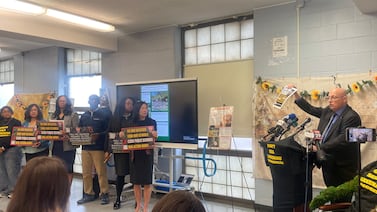With its new universal preschool program, Colorado joins a small but growing group of states that offer tuition-free preschool to all 4-year-olds.
So far, the program is popular with families, but there have been lots of bumps in the road, including three lawsuits against the state and the threat of a fourth. Some of the hiccups and headaches are usual new-program fare while others stem from the program’s rushed rollout by a new state agency.
Despite the problems, the $322 million program is a big deal. Funded partly with a nicotine tax that Colorado voters passed easily, it’s cutting preschool tuition costs for thousands of families and helping more Colorado children get ready for kindergarten. Nearly 50,000 preschoolers are enrolled this year, more than double the number served in the state’s previous smaller preschool program.
Universal preschool has long been one of Gov. Jared Polis’ signature initiatives and its launch last August represents the second and harder half of the governor’s ambitious early childhood agenda. Free full-day kindergarten, which kicked off in 2019, was the other major component.
Here’s a closer look at four key issues that have cropped up during the preschool program’s first six months.
A surge in demand led to tough decisions — and could again
More than 38,000 4-year-olds — 60% of that age group in the state — are enrolled in universal preschool this year. That’s about 8,000 more 4-year-olds than the state expected. In addition, the program includes more than 10,000 3-year-olds with risk factors.
The surge in demand meant state officials had to spread the money more thinly than planned. Last summer, just weeks before preschool was set to start, they told thousands of families that their children wouldn’t get free full-day preschool, only half-day, because there wasn’t enough funding. Some of the students who lost out — low-income students and English language learners — are those who stand to benefit the most from extra preschool.
The state has already taken steps to remedy this problem for about 3,000 children next year, specifically those living in poverty. A proposed rule would prioritize those 4-year-olds for full-day classes. At the same time, the state expects even more 4-year-olds — as much as 64% of that group — to enroll in universal preschool next year. With next year’s state budget not yet set, the possibility of another surge in demand, and a slew of new rules under consideration, it’s unclear how far the money will go.
State leaders promised high-quality preschool. It will take years.
One of the casualties in the race to stand up the new preschool program were rules governing program quality. State officials ran out of time to craft those rules, so they told participating preschools last spring to “keep doing what you’re doing.”
That means preschools are required to meet only basic health and safety standards this year, not other benchmarks of quality, such as small class sizes, highly trained teachers, and strong curriculum. Some participating preschools already embrace high-quality practices, but not all do. That leaves the current universal preschool landscape a mish-mash of superior programs, mediocre programs, and everything in between.
Experts say quality standards matter because when preschool is done well, it can have short- and long-term benefits for children — boosting academic skills, increasing the likelihood of graduating from high school, and even improving adult job and health outcomes.
Colorado officials are planning to adopt some quality rules for the 2024-25 school year and a separate set of rules on preschool staff credentials for the 2025-26 school year. But with some likely to be phased in over time, four or more classes of universal preschoolers may graduate from the program before a binding set of quality requirements take hold.
Colorado faces lawsuits as church-state legal landscape changes
Although faith-based preschools make up a tiny fraction of Colorado’s universal preschool providers, they’ve played an outsize role in recent legal challenges over the program’s policies.
Two of three lawsuits the state is facing over universal preschool revolve around a non-discrimination agreement state officials asked participating preschools to sign. The agreement bans discrimination based on various factors, including religion, sexual orientation, and gender identity, but a Christian preschool in Chaffee County and two Catholic preschools in metro Denver sued over the provision last summer.
In October, a federal judge blocked Colorado from withholding universal preschool funds or disciplining the Chaffee County preschool even though its policies on employee hiring and bathroom and pronoun use appear to violate the non-discrimination clause.
The lawsuit by the Catholic preschools, which is set to go to trial in early January, is broader. Like the Chaffee County case, it takes issue with the possibility of hiring staff who don’t reflect the schools’ religious tenets, but it also challenges the state’s mandate to accept all children and families regardless of religion, sexual orientation, and gender identity. The schools argue that enrolling all children conflicts with their religious beliefs and mission to provide a Catholic education.
There’s likely another battle over religion on the horizon. That’s because of a proposal to ban religious instruction during universal preschool classes starting next fall. The state intended to put that ban into place from the outset, but didn’t follow through — allowing participating faith-based preschools to incorporate religion however they see fit this year. That omission, set Colorado up for a conspicuous mid-stream flip-flop. The conservative group Advance Colorado has already threatened to sue if the state goes through with the proposed ban, citing a recent U.S. Supreme Court decision allowing public funding for religious education.
Class size debate is another symptom of funding challenges
This year, universal preschool classes can have up to 24 4-year-olds. That’s higher than most early childhood experts recommend, so the state has proposed capping the number at 20 starting next fall. A related rule would require one staff member for every 10 children, down from one per 12 this year.
But some participating preschools literally banked on having 24 students per class and 12 students per staff member. (The state pays about $6,000 per child for half-day preschool.) If the proposed changes are adopted, these providers stand to lose tens of thousands of dollars next year and some have said they would pull out of the program altogether.
The class size dilemma, especially in a field known for razor-thin margins and low pay, is another example of the tension between Colorado’s promise of high-quality preschool-for-all and the reality of limited funding. Although universal preschool’s $322 million price tag sounds like a hefty sum, preschool providers, school districts, and lawmakers have questioned whether it’s enough to support the program Colorado leaders envisioned.
Ann Schimke is a senior reporter at Chalkbeat, covering early childhood issues and early literacy. Contact Ann at aschimke@chalkbeat.org.








